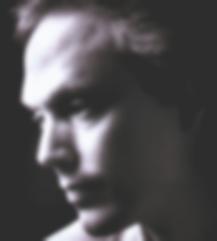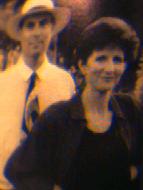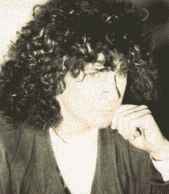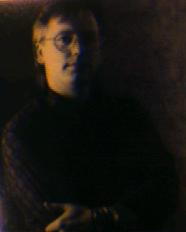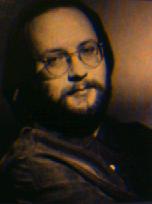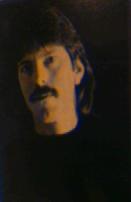
NARADA
![]()
An unoffical (and very incomplete) page.
The latest Narada News and other sites.
The official site.
Additional information always welcome.
|
"At first what I was playing didn't seem dissonant or complex enough. I had all sorts of intellectual reservations. Finally I just started being myself and let my music reflect that. My approach to music is a bit like talking to a friend. If you say what's in your heart, it's usually very simple."
Started playing music with a number of pop-rock bands in Seattle. He later studied jazz before pursuing his own style of pop impressionism. Working at first in a bar in Seattle playing standard piano fare, his renditions of his own compositions drew such a positive reaction from the audience that his work soon became the main attraction. He released nine albums, both solo and collaborative projects, during Narada's first 10 years. His work, from the classic single Behind the Waterfall to the best-selling album CRISTOFORI'S DREAM, has established Lanz as one of contemporary music's most admired pianists/keyboardists. |
david lanz
|
|
nancy rumbel
|
"My involvement with music began with the piano. When I finally could reach it, I began exploring its phenomenal capabilities, quickly prompting my mother to direct my wild improvisations into some sort of form and structure.
"Children feel joy and spontaneity and exhilaration when they make music, yet those emotions often disappear when formal music training begins. Music training today, I feel, too often emphasizes technique and musicianship while overlooking composition and improvisation. Somewhere a balance should be struck. Ideally, music education should help children become not only musicians, but also creators. The goal is to inspire children to want to play so that learning is a joy. A passion for learning and creating is perhaps the most important ingredient you can nurture in any student. Once the passion flows, the muse emerges." Often found playing woodwinds and other instruments to Eric Tingstad's acoustic guitar. Born one day apart in the month of December, they have performed in concert everywhere from the Berklee Performance Center in Boston to a rocky outcrop atop Glacier Point, high above the valley floor in Yosemite National Park. They first met at an outdoor music festival in 1984. Both gifted soloists, the two musicians sensed an uncommon rapport in their styles and, a year later, initiated a collaboration. Their fluid interplay has matured into what one observer has defined as "contemporary chamber music." Their performances have often benefitted schools, the homeless, environmental causes and health research. |
|
"I like taking a storyteller's approach to music. Music appeals to me most when it conveys a sense of adventure. It allows me to create an atmosphere where people are encouraged to use the full resources of their imaginations, to see and feel as well as hear."
Inspired by the complex synths of Kitaro, composer of five best-selling albums during Narada's first 10 years, emerged as one of contemporary music's most popular instrumentalists during that period, earning a Grammy nomination for his 1991 album IN THE WAKE OF THE WIND. Many fans however have been disappointed with his recent albums because of his growing use of vocals. |
david arkenstone
|
|
peter buffett
|
"My music often reflects a longing for life in a simpler but wiser world. There are few physical thresholds that we haven't crossed on this planet, but we still have a lot to discover about ourselves."
Owns a long list of commercial and production music credits that includes composing music for the film Dances with Wolves. While Buffett employs some of modern music's most sophisticated technology in his work, his themes often touch on his interest in American Indian culture and his wistful yearning for a peaceful, more innocent world. |
|
"My music is an extension of my life story. I write about memories that are important to me -- of my family, the mountains in Colorado where I grew up, the beauty and diversity of the seasons, my daughter's smile. Many life experiences have helped shape my music."
"I was 9 when the moving truck delivered our first family piano to our home in Colorado. It was an upright, and it took up an entire wall in our living room. As my love for playing grew, a few years later my parents surprised me on my birthday with a very special gift -- a new Yamaha grand. As if this were not enough of a surprise, my parents had the new piano placed in my room, which is where I discovered it when I came home from school that day. This required substantial furniture rearranging -- even the acquisition of a smaller bed. From that moment, I literally lived in my room. My parents and I shared a bedroom wall and, to their chagrin, I usually played late into the night. Even after I left for college, I always looked forward to coming home and getting reacquainted with those special keys. "That was a decade ago. Last spring, a moving truck arrived at my home in Seattle. While I was away teaching at school, a well-cared-for Yamaha grand was moved into my studio. These keys know every note I've ever played -- my very heart and soul. Welcome home..." Music teacher, father, outdoorsman, pianist -- was, at age 13, the youngest musician ever to perform and tour Europe as a member of the Golden (Colorado) Symphony Orchestra. vGettel, who each spring takes a groups of students to North America's desert southwest for a two-week backcountry expedition, considers himself a "musical historian" who often thinks of his compositions as deeply personal entries in a lifelong diary. |
michael gettel
|
|
michael jones
|
"Sometimes we have something to offer and we're the last to know it."
"The pleasure I derive most from music comes not so much from writing tunes as in painting images and telling stories. I love to weave several melodic ideas together and see where they take me. Each time I start a composition I feel I am at the beginning of a journey, one in which the outcome remains uncertain. As I create, something is creating me, and ultimately I realize that the deeper story I am telling is my own." "My fascination with the piano began when I was 2. I was captivated by the smell of the wood, the smooth, cool texture of the ivory keys, the sensation of the notes and the feeling they created as they resonated through my body. In time I learned the clarinet and the saxophone, but felt satisfied only when I played them with an orchestra or band. The piano, though, was complete in itself. With it, I was the orchestra. "However, after years of classical training and quiet evenings of improvisation, I eventually set aside my piano playing and yielded to the more practical concerns of building a career as an educator and consultant. Yet my love for the instrument never waned, and often I could be found musing at the keyboard. One evening in the lobby of a restored hotel, an older gentleman found me at the piano and shared my astonishment at the sounds that flowed from it. "Later, I explained to him my role as a consultant and my reluctance to leave such an orderly and rational world for the more mysterious realms of piano playing. His eyes flashed intensely, `But who will play your music?' he asked. I heeded his words. It was the piano that most excited me and invigorated my heart. Once again I tapped the wellspring, allowing my fingers to dance over the keys and giving myself over to an adventure that would have no beginning and no end." A lifelong musician who found success early in life as an educator/consultant, might never have recorded his music had it not been for the constant prodding from friends who had been enchanted by one of his spontaneous after-dinner recitals. Their instincts were correct; Jones released nine albums during Narada's first decade, including the label's first album. |
|
"[The piano became] the source of the most profound heart-and-soul relationship I have ever had. [Music] is an expression, a reflection, of the divine nature of the human spirit. When I am playing music, it is then that I am most able to feel the power, joy and freedom of the human spirit at work."
"I was 4 years old when I received my first piano -- a 1937 Wolkenhauer upright. My parents had sent it as a gift from East Germany, where they lived and worked. My home was in Russia, with my grandmother in a tiny apartment in St. Petersbury. This piano was the center of life in our home. Even my pet rooster, Peter, used its lid as his favorite perch, the place where he would listen as I played. "I am grateful to have studied under two of Russia's great master teachers, Vladimir Nielsen and Tamara Karetkina, who encouraged a sense of reverence for the relationship between pianist and piano. To the musician, the piano is more than a box with keys and wires; it is a part of music itself. When I play, the piano becomes part of me, and I become more than myself. It is a bridge to the dimension where music exists, and it takes time and talent to be in tune with the piano -- to be in tune with music. It is a mystery, I know, but it is a wonderful mystery, and my life as a musician is devoted to understanding it more deeply." The son of a well-known Russian actor, was born Konstantin Efimov in St. Petersburg. Music became the focus of his life at age 4, leading to classical piano studies at the famed Leningrad Conservatory under Vladimir Nielsen, one of the last great teachers of Russian romanticism. Kostia performed throughout Eastern Europe and Scandinavia before moving to the United States in 1989. |
kostia
|
|
sheldon mirowitz
|
"People ask me whether writing for film is a creative constraint. For me, it's quite the opposite. I find the needs of a film provide a spark for my imagination, and a challenge to my craft. Making music in the service of a film is no more a creative constraint that having a point to make is a constraint on a person's ability to speak beautifully."
"It all began with Mrs. Small, and a yellow upright that stood against a wall of my kindergarten classroom. Mrs. Small would play the piano to call us to attention, to announce nap time, to accompany our singing, or just so we could listen. I think that in a way I was falling in love -- a little bit with Mrs. Small, a little with the piano, and a lot with music itself. "I did little else during my first week of class but hover by the piano. Mrs. Small, concerned by my lack of interest in anything else, called my parents and suggested piano lessons. Within a week we had a new piano in the den (a spinet with mush action which is more suburban furniture than musical instrument). That piano saw me through years of lessons, though I never liked it. It is still in the den of my parents' home in St. Louis. Each time I go back it is a little more out of tune. Of course, I play it nonetheless." Has composed numerous scores for film and television productions, including music for the seven-part television series COLUMBUS AND THE AGE OF DISCOVERY. |
|
"What I do is interpret. I try to find impressions or emotions which other people in the production haven't been able to film or put in a script, then I convey them through music."
Added the soundtrack for MILLENNIUM: TRIBAL WISDOM AND THE MODERN WORLD to the lengthy list of scores he has composed for major film and television productions. Others include Rain Man, which earned him an Academy Award nomination, Driving Miss Daisy, Thelma and Louise, and more recently The Lion King, which earned him both an Academy Award and a Golden Globe. |
hans zimmer
|
| ...more... |
Links to this page:
Harmony Music List
Triad Studios
KSBR Jazz
Yahoo
Virtual Worlds
J. Julian
valdas Music
ronr's Bookmarks
Karin's Piano
G. Delgado
M. Habazaki
Eskimo Joe
mdan
Destination New Age
Amazing Sounds
Nuevas Músicas
Barbershop Harmony
